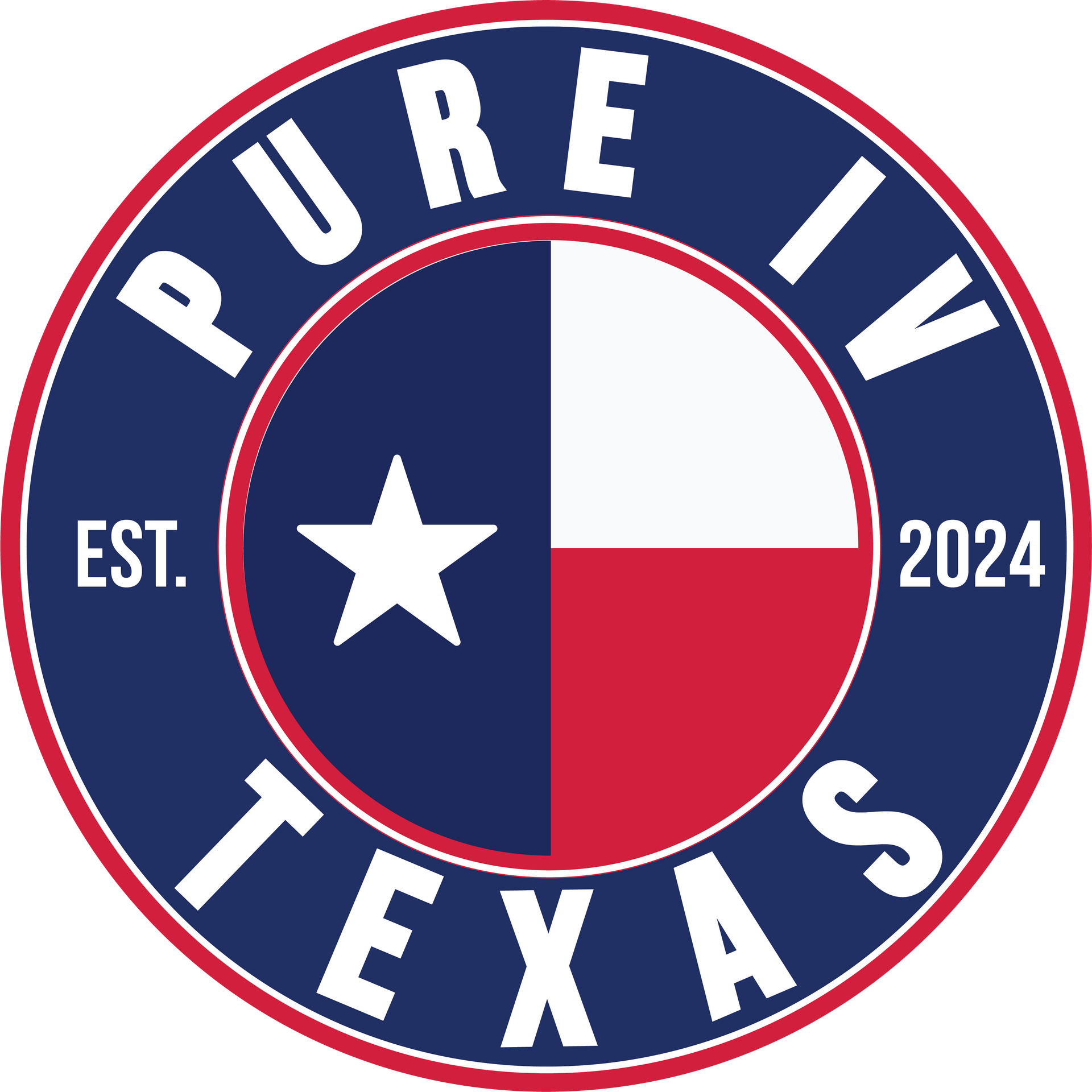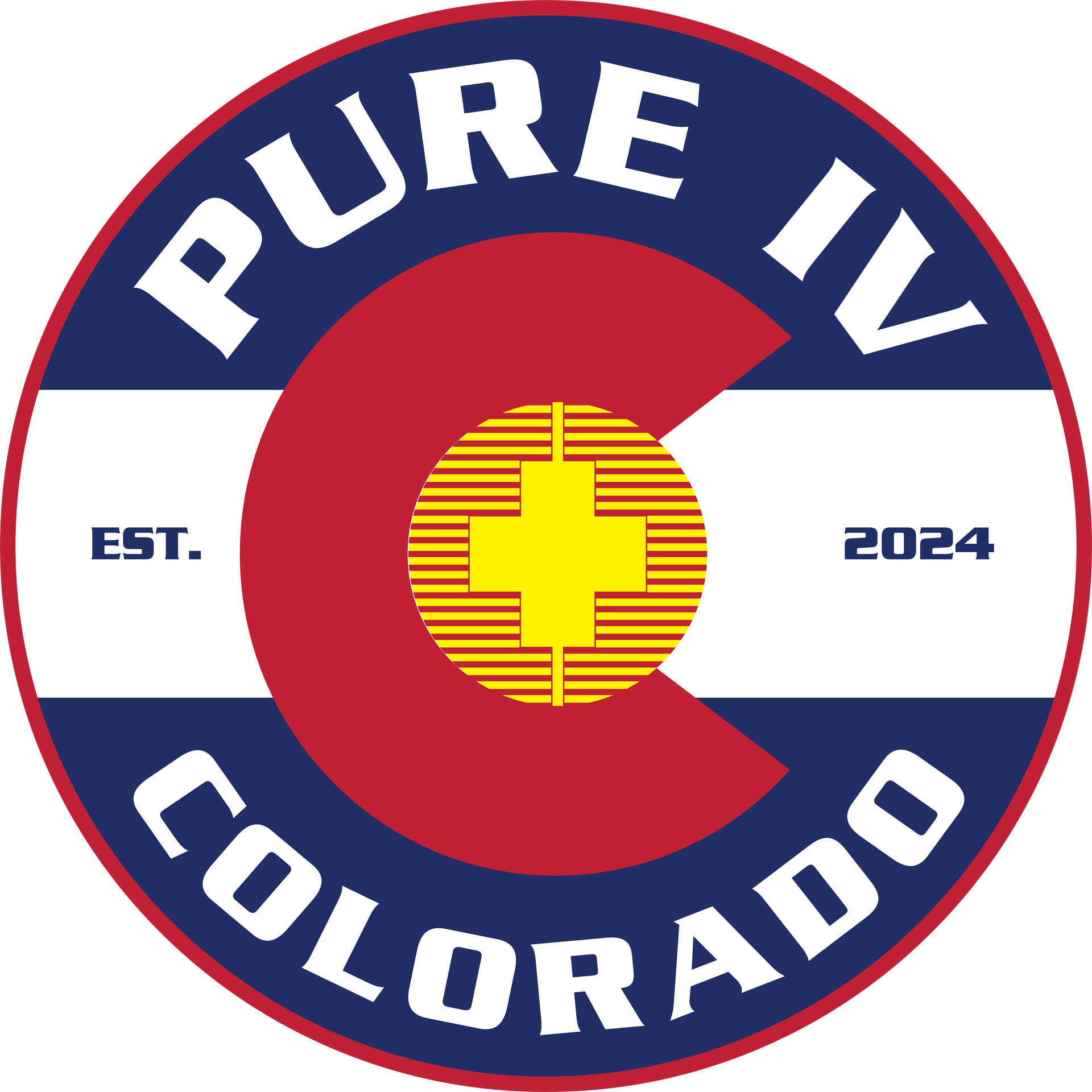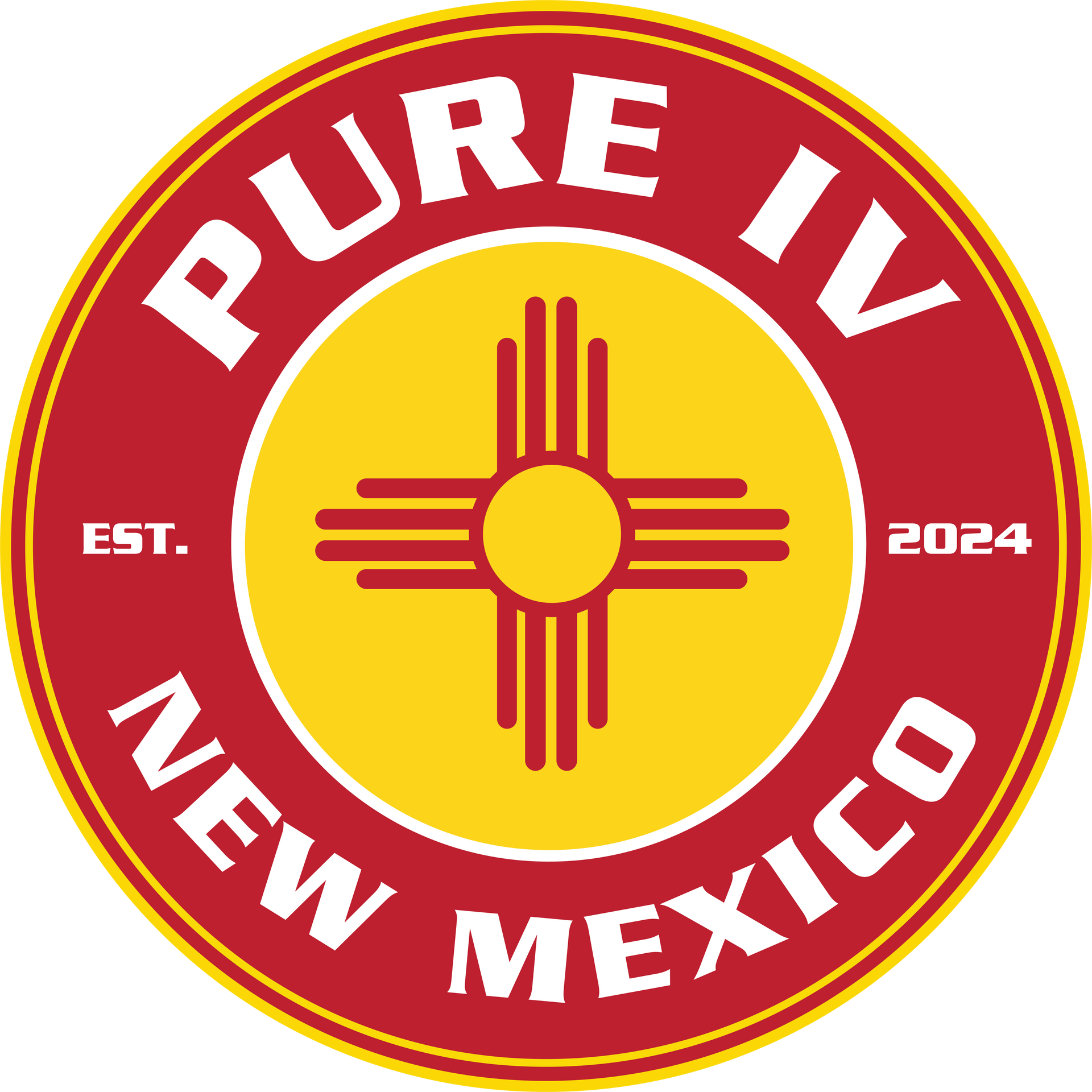Hangover 101: How To Cure A Hangover
At the end of the night, you knew that last glass of wine or bottle of beer wasn't a good idea. Now, your body is giving you a painful reminder of your overindulgence last night. This may make you feel queasy, dizzy, thirsty or shakey. You might feel like crawling back into bed, pulling the covers over your head, and sleeping for hours.
A hangover is a set of symptoms you experience after drinking too much alcohol. The symptoms of a hangover vary from person to person and even from hangover to hangover. There is no way to predict whether drinking alcohol will result in a hangover. You may or may not have a hangover the following day.
Avoiding and reducing hangover symptoms can help you enjoy your evening without worrying about the next morning.
Ways To "Cure" A Hangover
If you drank a few too many margaritas at Cinco de Mayo or a bottle of wine at a friend's wedding, you're facing a nasty hangover today. As you can't change the past, the best thing you can do is find a way to relieve your symptoms. You might feel better by doing one or a combination of the following:
Boost your nutrients
You might be able to reduce the symptoms of your hangover with vitamins and minerals. Taking 1,200 mg of vitamin B6 before, during and after drinking could help minimize hangover symptoms, according to one study. IV therapy provides a quick source of nutrients. A popular hangover remedy is the Myers' Cocktail. To help reduce fatigue and rehydrate the body, it contains ingredients such as B complex, B12, saline, vitamin C, magnesium, zinc, and the amino acid glutathione.
Take medicine
After a night of overindulgence, popping a pain-relieving pill, such as aspirin or ibuprofen, may relieve aches and pains in your body, such as headaches or body aches. Be cautious about the medicines you take. After drinking, you shouldn't take acetaminophen (aka Tylenol), since it can damage the liver. Naproxen, aspirin, and ibuprofen are the best choices, as they reduce inflammation in the body. Try chewing an antacid if you have a tummyache or indigestion, too.
Drink water or sports drinks
It's a good idea to keep your body hydrated while you bounce back from a hangover, even though electrolyte levels are pretty similar among hungover and non-hungover people. Drink plenty of plain water throughout the day, or try coconut water or sports drinks if you need an extra boost. Drinking water or other hydrating fluids is particularly important after vomiting or diarrhea, as both can cause you to become dehydrated.
Sleep it off
When you have a hangover and all you want to do is go back to bed, go right ahead and do that. A hangover can be helped by time, so if you go to bed and sleep, your hangover might have worked itself out by the time you wake up.
Eat something
You should avoid eating greasy foods if you are looking to alleviate hangover symptoms. You should instead eat bland foods that will not upset your stomach and will replenish your nutrients. When you're hungover, you should follow the "BRAT" diet. Eat bananas, rice, applesauce and toast, as they are easy on the digestive system, help to restore blood sugar levels and won't make you feel queasy.
Skip the hair of the dog
According to some people, the best way to get rid of a hangover is to drink more. The phrase "hair of the dog" comes from the belief that the best way to cure rabies is to drink a potion that contains the hair of a rabid dog that bit a person. You can temporarily dull your symptoms the next morning by drinking another beer, a mimosa or a bloody Mary. However, it won't relieve the hangover.
How To Prevent A Hangover In The First Place
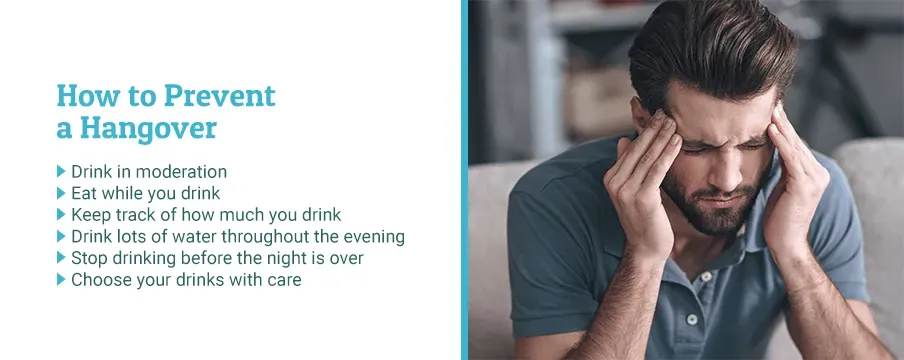
While there is no surefire cure for a hangover, there is one surefire way to prevent one - don't drink alcohol in the first place. Of course, there will be times when you do want to celebrate a milestone or accomplishment with a beverage or two. Celebrating doesn't always mean that the next day will be miserable. To prevent or reduce the symptoms of a hangover, there are a few things you can do.
Moderation is key
When you drink in moderation, you're less likely to suffer physical hangover symptoms the next day. For women, a moderate amount of alcohol is one drink per day and for men, two drinks per day. Women may experience hangover symptoms after drinking three drinks in a night, while men may experience symptoms after five drinks. Some "drinks" may be more than one, depending on their size and alcohol content. For example, a five-ounce pour of wine, a 1.5-ounce shot of liquor, or a 12-ounce bottle of 5% beer may be more than one "drink."
Eat while you drink
When you drink on an empty stomach, you speed up the rate at which your body absorbs alcohol. Have a meal before you start drinking to reduce the effects of a hangover the next day. Eating while you drink is your next best option. Consider ordering a meal with your beer or enjoying cheese while sipping wine.
Keep track of how much you drink
It's a good idea to keep your body hydrated while you bounce back from a hangover, even though electrolyte levels are pretty similar among hungover and non-hungover people. Drink plenty of plain water throughout the day, or try coconut water or sports drinks if you need an extra boost. Drinking water or other hydrating fluids is particularly important after vomiting or diarrhea, as both can cause you to become dehydrated.
Drink lots of water throughout the evening
You can prevent a hangover in two ways by drinking water or other non-alcoholic drinks throughout the evening. Drinking wine, beer, or spirits alternately with water keeps you hydrated. After drinking an alcoholic beverage, you should follow it with a soft drink. If you drink two glasses of water between beers, you can end up having just two if you would typically have four.
Stop drinking before the night is over
After consuming alcohol, your body needs time to process it. You will likely feel hungover the next day if you keep drinking right up until last call. In general, one ounce of alcohol takes your liver approximately one hour to metabolize. Your body will feel better tomorrow if you give it plenty of time to metabolize the alcohol you consumed.
Choose your drinks with care
Isn't a drink just a drink? Not when you're hungover. Whiskey, red wine, and brandy contain more congeners than others. Chemical compounds called congeners can be broken down in the body to toxic chemicals like formic acid and formaldehyde. They're known to exacerbate hangover symptoms. Light-colored spirits and light-colored beer and wine, as well as vodka and gin, provide a more comfortable morning after.
What Causes a Hangover in the First Place?
If hangovers were the result of one thing, then they would be a lot easier to treat or to avoid. Hangovers are instead caused by a variety of factors, all of which conspire to make the day after a big night out a bit difficult. Understanding that hangovers are caused by alcohol is essential for preventing them. When you feel tired, nauseous, and worn out for any number of reasons, you only tell people that you've got a hangover if you've recently consumed alcohol.
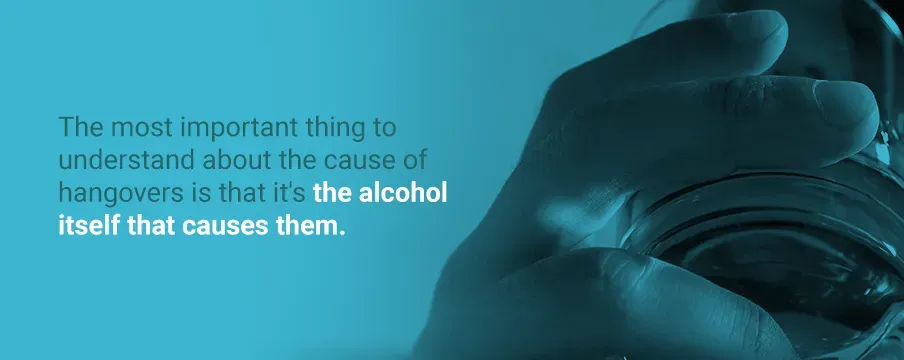
The various effects that alcohol can have on your body often combine to create a perfect storm that leads to a hangover. If you drink more than moderately, you may experience the following symptoms:
Low blood sugar
Drinking alcohol lowers your blood sugar, which causes your body to produce more insulin. The effects of alcohol on insulin levels and the effectiveness of insulin can lead to high blood sugar levels over time. Drinking alcohol tends to lower blood sugar in the short term. Low blood sugar levels can make you feel shaky, weak, and fatigued, all symptoms associated with being hungover.
Inflammation
An inflammatory response throughout your body can also cause a hangover. Cytokines are molecules produced by your immune system. They can either help or trigger inflammation. Drinking tends to increase the production of pro-inflammatory cytokines in your body. As a result of alcohol's inflammatory effects, anti-inflammatories, such as ibuprofen and B vitamins, help to minimize hangover symptoms.
Digestion disorders
If you suffer stomach or digestive upset as a result of heavy drinking, it is probably the result of the alcohol. When you drink alcohol, your stomach produces more acid, which can cause discomfort. Also, alcohol can cause food to stay in your stomach longer, causing discomfort.
Dehydration
While alcohol itself does not dehydrate you, it makes you pee more often since it is diuretic. Your body excretes 10 ml of urine for every gram of alcohol you consume. Dehydration is more likely to occur when you're peeing a lot. This can lead to dizziness and thirst. It can also cause headaches.
Disruption of sleep
Alcohol can result in sleeplessness, but it also affects your sleep quality. Alcohol helps you fall into a deep sleep but keeps you from entering the rapid-eye-movement (REM) stage. REM is the more restful stage. You're likely to feel tired and out of sorts the next day without it.
Vasodilation
Vasodilation means that alcohol makes your blood vessels wider, so that blood flows more freely through them. You may experience headaches as a result of wider blood vessels. Additionally, migraine sufferers may notice that drinking triggers a migraine the next day.
Hangover Symptoms and What Makes Some Hangovers Worse Than Others
When do you know you have a hangover? When you wake up feeling miserable after drinking the night before, you're probably suffering from a hangover rather than something like a stomach bug or the flu. Normally, hangovers begin the day after you drink, as they don't begin until your blood alcohol content is near zero.
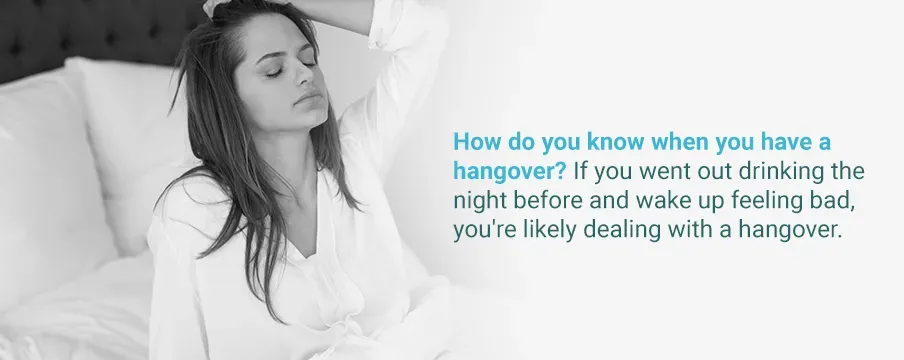
A hangover is characterized by the following symptoms:
- Vomiting and feeling sick to your stomach
- Experiencing fatigue
- Feelings of thirst or dry mouth
- Shakiness
- A poor night's sleep the night before
- Concentration problems
- Anxiety or irritability
- Dizziness
- Sound and light sensitivity
- Headache
- Muscle aches
- Fast heartbeat
There are some hangovers that are worse than others. You may wake up after consuming a bottle of red wine with a mouth that feels like it's stuffed with cotton, an upset stomach, and a pounding headache. You might wake up the morning after you drink a bottle of white wine with a mild headache and no other symptoms. Drinking the wrong kind of beverage can lead to hangovers.
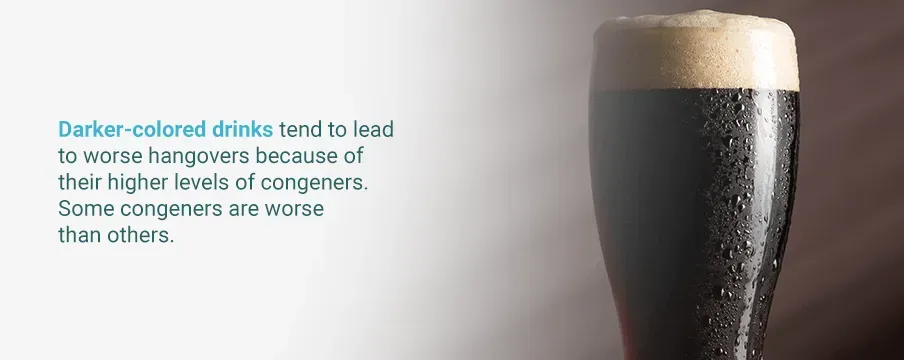
Drinks with darker colors tend to lead to worse hangovers due to their higher concentrations of congeners. However, some congeners are worse than others. As an example, methanol tends to stay in the body long after other alcohol-related compounds have been eliminated. Drinking whiskey or red wine tends to cause a hangover, since these drinks contain the most methanol.
Hangovers are also a problem for some people more than others. You can be hung over the day after a big party based on your age, sex and genetic makeup. After a night of drinking, you are more likely to report symptoms as you age.
Additionally, women are more likely to suffer from hangover symptoms than men. More than 1,200 undergraduates were asked to rate 13 hangover symptoms in a study. The symptoms reported by female respondents tended to be worse than those reported by male respondents.
There are a few reasons why a woman might suffer from a worse hangover than a man. In general, women tend to weigh less than men and have less body water, which makes them more susceptible to the effects of alcohol.
In addition, genetics can play a role in how a person's body processes alcohol and how severe their hangover will be. Due to a genetic mutation, people from Japan, China, and Korea are more likely to be intolerant to alcohol than people from other places in the world. A liver enzyme, aldehyde dehydrogenase 2 (ALDH2), transforms acetaldehyde, a substance produced by alcohol, into acetic acid, or vinegar. In East Asia, people often have mutations that affect the ALDH2 enzyme, causing it to be inactive or less active. In the absence of the enzyme, acetaldehyde builds up in the blood, aggravating hangover symptoms. A person's skin may turn red shortly after drinking alcohol as a sign of alcohol intolerance.
Should You See a Doctor About a Hangover?
Even though a hangover may seem like an emergency that requires medical attention, most symptoms resolve on their own within 24 hours. There are cases, however, when your symptoms might seem bad enough to warrant a trip to the doctor. You might be concerned if you experience symptoms almost every day or suffer from hangovers quite often.
The effects of alcohol on the overall quality of your life might concern you if you experience hangover symptoms more than occasionally. A doctor may be able to help you if you have symptoms frequently enough that you struggle to do your job or notice a decline in your overall quality of life. Medical professionals can help you reduce the amount of alcohol you consume or help you stop drinking altogether.
In some cases, drinking a lot of alcohol can lead to an emergency. The consequences of alcohol poisoning are different from those of a hangover. Alcohol poisoning should be treated immediately. The following signs indicate alcohol poisoning:
- Disorientation or confusion
- Breathing that is irregular or very slow
- Seizures
- Losing consciousness and not being able to regain it
- Skin that is excessively pale or blue
- Body temperature is very low
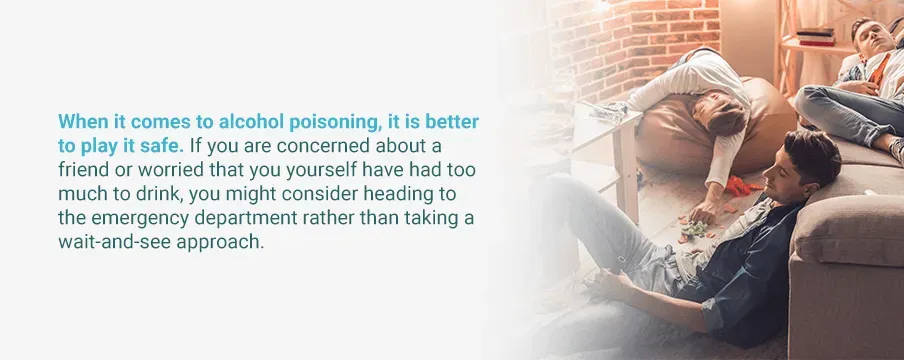
It is better to be safe when it comes to alcohol poisoning. It would be better to head to the emergency department rather than wait and see if a friend has had too much to drink, or if you have had too much to drink yourself. Medical professionals can help you get the appropriate, potentially life-saving treatment.
Get Help for Your Hangover Symptoms
Did you drink too much last night? You don't have to spend your morning and afternoon moping around in misery. Getting back on your feet is easy with Pure IV Texas' in-home IV therapy. We offer supervised IVs such as the Myers' cocktail to boost your immune system and relieve hangover symptoms. Vitamins and minerals can help you recover without having to go to the hospital.
Whenever you call, a registered nurse or paramedic from our team will assess your needs, learn more about your medical history, and recommend the best treatment for you. A member of our team will come to your home within an hour if you live within our service area, which includes locations throughout Texas.
Hangovers are rough enough. An IV in the comfort of your own home takes the edge off.
Get in touch with us today to learn more about your options and how we can help you.
